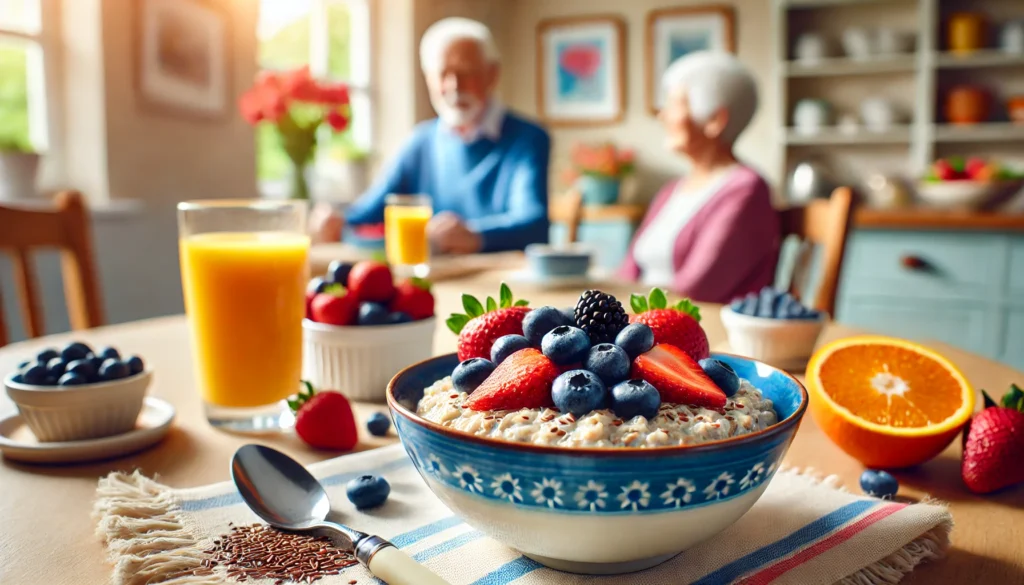As we age, maintaining optimal brain health becomes a priority. The brain, like any other organ, requires nourishment to function at its best. While genetics and lifestyle factors play a role, diet is a critical element in preserving cognitive functions in seniors. This article explores the top brain foods that can help boost senior health, providing a detailed look at how these foods can support memory, enhance focus, and promote overall brain vitality.
You may also like: Top Foods to Enhance Your Memory
The Importance of Nutrition for Cognitive Health
Nutrition is a cornerstone of brain health. The foods we consume provide the essential nutrients that fuel our brains, influencing everything from memory to mood. For seniors, who may be at increased risk for cognitive decline, focusing on nutrient-rich foods is particularly important. The best brain foods for seniors are those that support neuronal health, reduce inflammation, and improve blood flow to the brain.
Nutrients and Their Role in Brain Function
The brain requires a variety of nutrients to perform optimally. Omega-3 fatty acids, antioxidants, and vitamins such as vitamin B, D, and E play significant roles in maintaining cognitive health. These nutrients help in forming neurotransmitters, reducing oxidative stress, and maintaining neuronal structure. By ensuring a diet rich in these elements, seniors can support their mental agility and overall brain function.
The Link Between Diet and Mood
What we eat not only affects our physical health but also our mental well-being. Certain foods can influence the production of serotonin and dopamine, neurotransmitters that regulate mood and emotion. For seniors, maintaining a balanced diet that includes mood-enhancing foods can lead to better emotional health, which in turn supports cognitive functions. This holistic approach underscores the interconnectedness of diet, mood, and brain health.
Risks of Poor Nutrition in Seniors
Poor nutrition can lead to deficiencies that might accelerate cognitive decline in seniors. Insufficient intake of essential nutrients can result in memory lapses, decreased concentration, and a higher risk of neurodegenerative diseases. It’s crucial to address these nutritional gaps with a well-rounded diet to prevent potential cognitive impairments. Understanding these risks can motivate seniors and caregivers to prioritize nutrient-rich foods.
Best Brain Foods for Seniors
Several foods have been identified as particularly beneficial for brain health. Let’s dive into these “memory foods” and understand how they contribute to cognitive well-being.
Fatty Fish: The Omega-3 Powerhouse
Fatty fish such as salmon, trout, and sardines are excellent sources of omega-3 fatty acids, essential fats that our bodies cannot produce on their own. Omega-3s are crucial for maintaining the structural integrity of brain cell membranes and have anti-inflammatory properties that protect the brain from age-related damage.
The Science Behind Omega-3s
Research has demonstrated that omega-3 fatty acids play a vital role in brain health, particularly in enhancing communication between neurons. These fats are integral to synaptic plasticity, the ability of synapses to strengthen or weaken over time, which is essential for learning and memory. Including omega-3 rich foods in the diet can significantly impact cognitive longevity.
Omega-3s and Neuroprotection
Omega-3s are known to have neuroprotective effects, shielding the brain from oxidative stress and inflammation. They aid in the formation of cell membranes and promote the growth of new neurons. For seniors, these properties can help slow the progression of cognitive decline and support overall mental health.

Practical Ways to Incorporate Fatty Fish
Incorporating fatty fish into one’s diet can be as simple as enjoying a salmon salad or grilled trout for dinner. Aim for at least two servings per week to maximize the cognitive benefits. For those who don’t enjoy fish, omega-3 supplements can be a valuable alternative, though it’s always best to consult a healthcare provider before starting any supplement regimen.
Berries: Antioxidant-Rich Superfoods
Berries, particularly blueberries, strawberries, and blackberries, are packed with antioxidants and phytochemicals. These compounds combat oxidative stress, which can accelerate brain aging and contribute to neurodegenerative diseases. Berries have been shown to enhance communication between brain cells, improve memory, and reduce the risk of cognitive decline.
Antioxidants and Brain Protection
Antioxidants in berries help neutralize free radicals, unstable molecules that can damage cells and accelerate aging. By reducing oxidative stress, these compounds help protect the brain from age-related damage. Regular consumption of berries can thus contribute to better brain health and reduced risk of cognitive impairments.
Cognitive Benefits of Phytochemicals
Phytochemicals, the natural compounds found in berries, have been linked to improved brain function. They enhance neuronal signaling and protect neurons from damage. Studies suggest that these compounds can also improve cognitive functions such as memory and focus, making berries a smart choice for seniors.
Creative Ways to Enjoy Berries
Adding berries to the diet is easy and versatile. They can be enjoyed fresh or frozen, as part of a smoothie, on top of yogurt, or mixed into oatmeal. Encouraging seniors to include a handful of berries in their daily diet can lead to long-term cognitive benefits.
Leafy Greens: Nutrient-Dense Vegetables
Leafy greens such as spinach, kale, and Swiss chard are rich in brain-boosting nutrients like vitamin K, lutein, folate, and beta-carotene. These nutrients are thought to slow cognitive decline and protect against memory loss.
The Power of Vitamin K
Vitamin K found in leafy greens plays a crucial role in maintaining cognitive health by promoting brain cell growth and supporting synaptic plasticity. Studies have linked higher intake of vitamin K with improved memory and cognitive function, making it an essential nutrient for seniors.
Lutein and Visual Processing
Lutein, another vital nutrient in leafy greens, is known for its role in eye health but is also beneficial for brain health. It contributes to improved visual processing and cognitive function. Regular consumption of lutein-rich foods can support both vision and brain health, which is crucial for seniors.
Delicious Ways to Include Leafy Greens
Incorporating leafy greens into meals can be simple and delicious. They can be added to salads, smoothies, or sautéed as a side dish. Encouraging seniors to try different recipes with greens can help them enjoy the cognitive benefits without feeling like it’s a chore.
Nuts and Seeds: Tiny Powerhouses of Nutrition
Nuts and seeds, including walnuts, almonds, flaxseeds, and chia seeds, are excellent sources of healthy fats, protein, and antioxidants. Walnuts, in particular, are rich in DHA, a type of omega-3 fatty acid that has been linked to improved cognitive performance.
The Role of Healthy Fats
Healthy fats found in nuts and seeds are essential for brain health. They support the formation of cell membranes and the communication between neurons. By including these fats in their diet, seniors can maintain cognitive function and reduce the risk of cognitive decline.
Protein and Brain Health
Protein is crucial for the production of neurotransmitters, the chemicals that transmit signals in the brain. Nuts and seeds provide a plant-based source of protein, which can support brain function and mental clarity. Including these in the diet can help seniors maintain cognitive vitality.
Convenient Snacking Options
Nuts and seeds make for convenient and nutritious snacks. A small handful can be a perfect on-the-go option or a quick addition to meals. Encouraging seniors to replace unhealthy snacks with nuts and seeds can promote better brain health over time.
Whole Grains: Sustained Energy for the Brain
Whole grains such as oats, quinoa, and brown rice provide a steady supply of glucose, the brain’s primary energy source. Unlike refined grains, whole grains release glucose slowly into the bloodstream, ensuring a consistent energy level that supports concentration and focus.

Glucose and Cognitive Function
Glucose is the primary energy source for the brain, and maintaining stable glucose levels is crucial for cognitive performance. Whole grains provide a slow and steady release of glucose, which can help seniors maintain focus and mental clarity throughout the day.
The Benefits of Fiber
Whole grains are rich in fiber, which aids digestion and supports heart health. A healthy heart ensures proper blood flow to the brain, which is essential for cognitive health. By including whole grains in their diet, seniors can support both their brain and cardiovascular systems.
Easy Ways to Include Whole Grains
Incorporating whole grains into meals can be simple. Opt for oatmeal or whole-grain bread for breakfast, or use quinoa as a base for salads. Encouraging seniors to choose whole grains over refined options can lead to better cognitive health and sustained energy levels.
Integrating Brain Foods into a Senior’s Diet
Incorporating these brain-boosting foods into a senior’s diet doesn’t have to be complicated. Here are some practical tips to make it easier:
Planning Balanced Meals
Ensuring each meal includes a variety of brain foods can be achieved with thoughtful planning. Combining different food groups like a serving of fish, a side of leafy greens, and a handful of nuts in one meal can provide comprehensive nutritional benefits. This approach not only enhances cognitive health but also adds variety to the diet, making meals more enjoyable.
Smart Snacking Strategies
Encouraging healthy snacking options like berries or a mix of nuts and seeds can provide seniors with an antioxidant-rich boost between meals. These snacks are not only delicious but also packed with nutrients that support brain health. Keeping these snacks readily available can make it easier for seniors to choose healthier options.
Breakfast: A Nutrient-Packed Start
Starting the day with a brain-boosting breakfast can set a positive tone for the rest of the day. Whole-grain oats topped with fresh berries and a sprinkle of flaxseeds can offer sustained energy and essential nutrients. Encouraging seniors to prioritize breakfast can lead to improved focus and energy levels throughout the day.
Simple Dietary Swaps
Making small but impactful dietary changes can significantly improve brain health. Substituting refined grains with whole grains and choosing fatty fish over red meats are simple swaps that can make a big difference. Educating seniors about these changes can empower them to make healthier choices.
Consistency is Key
Regular consumption of these foods is crucial for reaping their cognitive benefits. Encouraging seniors to incorporate these foods into their daily routine can lead to long-term improvements in brain health. Consistency, rather than sporadic consumption, is what leads to lasting results.
Future Implications and Trends
As our understanding of nutrition and brain health evolves, the importance of diet in preventing cognitive decline will continue to gain recognition. Researchers are exploring the potential of specific nutrients and dietary patterns to delay or even reverse brain aging.
Personalized Nutrition Plans
Future trends in brain health may include personalized nutrition plans tailored to an individual’s genetic makeup and lifestyle. These customized strategies could optimize brain health by addressing specific needs and deficiencies. As technology advances, the ability to create such personalized plans will become more accessible, offering new hope for cognitive health preservation.
The Role of Emerging Research
Ongoing research into the impact of diet on cognitive function is uncovering new insights. Studies are examining how different dietary patterns, such as the Mediterranean or MIND diets, can specifically benefit brain health. These findings may lead to new dietary recommendations that further support cognitive longevity.
Innovative Nutritional Supplements
The development of innovative nutritional supplements targeting brain health is another area of growth. These supplements may offer concentrated doses of essential nutrients like omega-3s and antioxidants. While whole foods remain the best source of nutrition, supplements can provide additional support when dietary intake is insufficient.

Conclusion
The journey to preserving brain health in our later years is paved with nutritious choices. By understanding and integrating these top brain foods into daily meals, seniors can support their cognitive health and enjoy a more vibrant, fulfilling life. Whether you’re a health and wellness coach, a science journalist, or a biohacker, the message is clear: the foods we eat today shape the brain health we experience tomorrow. Let’s make every bite count.
Further Reading:
Top 10 Foods for Senior Brain Health
11 Best Foods to Boost Brain and Memory
5 Awesome Foods Linked To Better Brainpower For Seniors
Important Note: The information contained in this article is for general informational purposes only, and should not be construed as health or medical advice, nor is it intended to diagnose, prevent, treat, or cure any disease or health condition. Before embarking on any diet, fitness regimen, or program of nutritional supplementation, it is advisable to consult your healthcare professional in order to determine its safety and probable efficacy in terms of your individual state of health.
Regarding Nutritional Supplements Or Other Non-Prescription Health Products: If any nutritional supplements or other non-prescription health products are mentioned in the foregoing article, any claims or statements made about them have not been evaluated by the U.S. Food and Drug Administration, and such nutritional supplements or other health products are not intended to diagnose, treat, cure, or prevent any disease.


